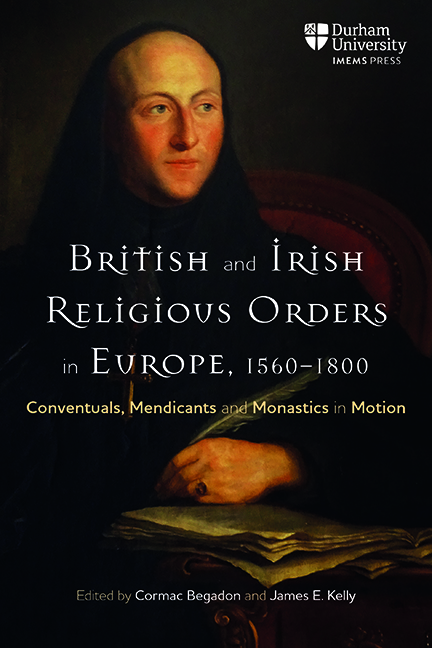 British and Irish Religious Orders in Europe, 1560-1800
British and Irish Religious Orders in Europe, 1560-1800 Published online by Cambridge University Press: 07 October 2022
‘They are strangers without support in a country which is as the place of their exile, which they suffer with so much courage & joy for the glorious cause of Religion.’
Keenly aware of their situation as exiles, members of the English convents were faced with many challenges as they sought to secure their survival. Their aim was to preserve their faith ready for the time when they would be able to practise it in their homeland among their countrymen. This brief extract from an appeal for assistance written in 1654 by the Poor Clares at Gravelines after they lost ‘the only retreat they had in the world’ following an explosion, focuses on how they were able to persevere – they suffered with joy for their religion.
Members of the English convents founded in exile – both the enclosed communities and the Mary Ward Sisters – were aware of their importance and the role they should play in the survival of English Catholicism for women, identified here as ‘the glorious cause’. Observing conventual rules with a heavy emphasis on obedience, most of them spent their lives within enclosures, with the result that, in the past, scholars frequently viewed nuns as withdrawn and passive. However, as a result of recent research and with greater access to their archives, it is clear that we need to review these opinions and recognise them as agents, participating in a long-term movement to secure the survival of their faith, making many decisions for themselves within the framework of their vows and their foundation documents. This chapter will also argue that the English nuns were mistaken if they thought that they were without support among their neighbours: in fact, there were many locals who cared and contributed to their survival in the long term.
Appeals for Support
From the early years of the foundations, convent communities were conscious of the need to raise funds for themselves in different ways. Several carefully worded appeals have survived in which they articulated calls for assistance. Expressions of grief, pain and suffering included in appeals, prayers, chronicles and even obituaries served to motivate external supporters as well as to spur members on in their striving for spiritual improvement. Some nuns had already experienced suffering before they joined; others deliberately embraced hardship and pain after profession.
To save this book to your Kindle, first ensure [email protected] is added to your Approved Personal Document E-mail List under your Personal Document Settings on the Manage Your Content and Devices page of your Amazon account. Then enter the ‘name’ part of your Kindle email address below. Find out more about saving to your Kindle.
Note you can select to save to either the @free.kindle.com or @kindle.com variations. ‘@free.kindle.com’ emails are free but can only be saved to your device when it is connected to wi-fi. ‘@kindle.com’ emails can be delivered even when you are not connected to wi-fi, but note that service fees apply.
Find out more about the Kindle Personal Document Service.
To save content items to your account, please confirm that you agree to abide by our usage policies. If this is the first time you use this feature, you will be asked to authorise Cambridge Core to connect with your account. Find out more about saving content to Dropbox.
To save content items to your account, please confirm that you agree to abide by our usage policies. If this is the first time you use this feature, you will be asked to authorise Cambridge Core to connect with your account. Find out more about saving content to Google Drive.